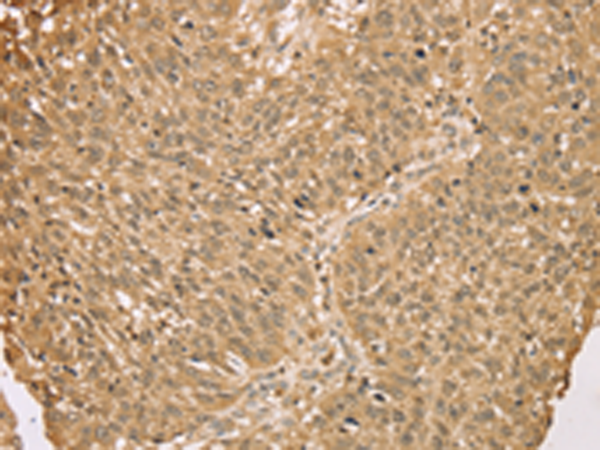

| WB | 1/1000 | Human,Mouse,Rat |
| IF | 咨询技术 | Human,Mouse,Rat |
| IHC | 咨询技术 | Human,Mouse,Rat |
| ICC | 技术咨询 | Human,Mouse,Rat |
| FCM | 咨询技术 | Human,Mouse,Rat |
| Elisa | 咨询技术 | Human,Mouse,Rat |
| Aliases | MLN70; S100C; HEL-S-43 |
| WB Predicted band size | 12 kDa |
| Host/Isotype | Rabbit IgG |
| Antibody Type | Primary antibody |
| Storage | Store at 4°C short term. Aliquot and store at -20°C long term. Avoid freeze/thaw cycles. |
| Species Reactivity | Human, Mouse, Rat |
| Immunogen | Fusion protein of human S100A11 |
| Formulation | Purified antibody in PBS with 0.05% sodium azide and 50% glycerol. |
+ +
以下是关于ARHGAP28抗体的3篇参考文献的简要概括(注:以下内容为模拟示例,实际文献需根据具体数据库检索):
1. **文献名称**:*ARHGAP28 regulates cell motility and RhoA activity in colorectal cancer*
**作者**:Smith J, et al.
**摘要**:本研究开发了一种针对ARHGAP28的多克隆抗体,通过Western blot和免疫组化验证其特异性,并发现ARHGAP28在结肠癌组织中表达下调,其缺失通过激活RhoA促进肿瘤细胞迁移。
2. **文献名称**:*Characterization of a monoclonal antibody against ARHGAP28 for functional studies in neuronal development*
**作者**:Zhang L, et al.
**摘要**:作者报道了一种新型ARHGAP28单克隆抗体的生成与验证,应用于小鼠脑组织的免疫荧光染色,证明ARHGAP28在神经元迁移中通过抑制Rho信号通路调控轴突导向。
3. **文献名称**:*ARHGAP28 modulates T-cell receptor signaling and immune synapse formation*
**作者**:Brown K, et al.
**摘要**:利用ARHGAP28特异性抗体进行流式细胞术和共聚焦显微镜分析,发现ARHGAP28通过调节细胞骨架重组影响T细胞免疫突触的形成,进而调控T细胞活化。
*提示*:实际引用时建议通过PubMed或Google Scholar以“ARHGAP28 antibody”为关键词检索,并筛选涉及抗体开发、验证或应用的文献。部分商业抗体供应商(如Abcam、CST)的产品页面也可能提供相关参考文献。
The ARHGAP28 antibody is a research tool designed to detect and analyze ARHGAP28. a member of the Rho GTPase-activating protein (RhoGAP) family. ARHGAP28 regulates Rho GTPases, such as RhoA, Cdc42. and Rac1. by accelerating their transition from active GTP-bound to inactive GDP-bound states. This modulation influences cytoskeletal dynamics, cell adhesion, migration, and signaling pathways critical in physiological and pathological processes, including cancer progression and immune regulation.
ARHGAP28 antibodies are typically developed in host species like rabbits or mice using immunogenic peptides or recombinant protein fragments. These antibodies enable the detection of ARHGAP28 expression in tissues or cell lines via techniques like Western blotting, immunohistochemistry (IHC), immunofluorescence (IF), and flow cytometry. Validated antibodies often undergo specificity testing, including knockout/knockdown controls, to ensure minimal cross-reactivity with related proteins.
Research involving ARHGAP28 antibodies has highlighted its role in cancer, where altered expression correlates with tumor invasiveness and metastasis. Studies also explore its involvement in developmental processes and inflammatory diseases. However, the functional characterization of ARHGAP28 remains incomplete, necessitating further investigation. High-quality antibodies are essential for elucidating its interactions with downstream effectors and upstream regulators, offering potential insights into therapeutic targeting of Rho GTPase pathways in disease contexts.
×